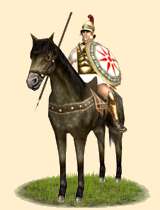Imperator Italicus (Italic General)
 |
Weapons | Defence | Mental | ||||||
|---|---|---|---|---|---|---|---|---|---|
| Primary | Secondary | Armour: | 13 | Morale: | 14 | ||||
| Type: | spear | sword | Shield: | 3 | Discipline: | disciplined | |||
| Attack: | 6 | 9 | Skill: | 9 | Training: | highly_trained | |||
| Charge: | 15 | 15 | Recruitment | Other | |||||
| Lethality: | 1 | 0.11 | Soldiers: | 25 | Hit Points: | 1 | |||
| Range: | 47.3 | 0 | Cost: | 3362 | Mass: | 1 | |||
| Ammo: | 6 | 0 | Upkeep: | 841 | |||||
| Turns: | 1 | ||||||||

By the third century much of central Italia had come under the sway of the Romani but many of its cities retained at least internal autonomy, even after becoming Socii, or Roman Allies. Each of these peoples had their own traditions and constitutions, as well as semi-independent militaries with their own commanders.
Superior
Hardy
An Italic general is a profesional soldier or an aristocrat of a lesser client-state. He is surrounded by a bodyguard of heavy cavalry who have sworn sacred oaths both to their leader and to each other. They are a profesional elite who make a living out of military service. These men wear bronze armor, have stout greaves, and good heavy spears with which to perform their deadly efficient work.
By the third century much of central Italia had come under the sway of the sons of Romulus through its heading of the Latin League, but many of its cities retained at least internal autonomy, even after becoming Socii, or Allies, of the Romani. At the same time to the south there remained a number of city-states of the Graeci, founded centuries earlier, while the memory of the Etrusci was still powerful in the north. The Samniti, perhaps the strongest tribal alliance among the Italics, and from whom the Romans borrowed their most famous military traditions, were still strong in the Appennine mountains. Each of these peoples had their own traditions and constitutions, as well as semi-independent militaries with their own commanders. Historically, many of these Italic noblemen gained Roman citizenship through diplomacy or conquest and later became Senators or Equestrians within the Roman state. Others who resisted Rome or sided with her enemies suffered ignoble deaths.